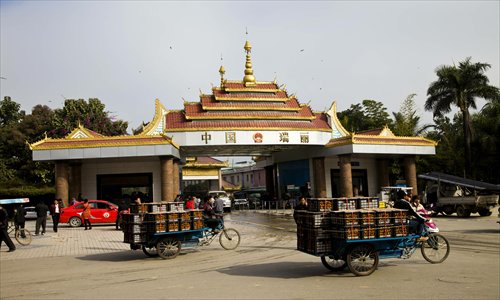On the run from Myanmar

"When night falls, you can see Myanmese people on the street injecting drugs, and Myanmese prostitutes standing around," Azhuo Zhihong, a jade trader and amateur photographer in Ruili, Yunnan Province, told the Global Times.
Azhuo photographs many people, among them the local Myanmese community. He says that this overlooked group of migrants often suffers from discrimination and exploitation, a claim that is backed up by a recent report.
Ruili straddles the border between Myanmar and China's Yunnan Province. Azhuo's home is within a stone's throw of the border, and he says Myanmese migrants often come across with no paperwork.
The report, compiled by the Burmese Women's Union (BWU), a Thailand-based NGO, indicated that the 50,000 to 100,000 Myanmese migrants in Ruili do the jobs nobody else wants to do, receive lower salaries than those of the locals and many are exposed to dangers and health risks.
Other local residents as well as government bodies, however, have slammed the report, saying that it's not an accurate picture of the lives of Myanmese migrants, who account for around a 10th of the city's overall population.
Victims' voices
"I started working at a small petrified wood workshop. There was so much dust and I had to buy a mask and a head covering. It was very dangerous," said a woman who was referred to as "Interview 3" in the report.
"I know one worker who got a piece of stone in his eye and was blinded. He got 3,000 yuan ($481) in compensation, but that was all. Another person was electrocuted to death because of faulty wiring with the cutting equipment. The owner didn't provide any compensation," she said.
Among the 32 women in the report who were employed across various industries, including domestic work, sex work, bead work, the gem trade, retail and construction, over half of them referenced dangerous work conditions or fear for their personal safety at work, and factory workers had among the highest number of complaints. Responses from sex workers also indicated that they were at high risk of physical danger, abuse and infection.
The illegality of sex work means it is secretive and unregulated. Sex workers are particularly vulnerable to health, safety and security risks. The most commonly-reported problems they have, according to various BWU studies in recent years, were police raids resulting in fines or arrest, violent clients (often under the influence of drugs), and the lack of consistent condom use resulting in the contraction of sexually transmitted infections and diseases, including HIV.
Some used violence to force Myanmese women to have unprotected sex, the report said. A 19-year-old sex worker, referred to as M in the report, said she had worked in Ruili since she was 17. Just two months after entering the industry, she tested positive for HIV. She was unsure where she contracted the disease, but reported that a client forced her at knifepoint to have sex without a condom.
The report also said that aside from the occupational health risks, many of these workers live in basic, dilapidated and overcrowded houses, and one third of them don't have official documents, such as Myanmese border-crossing passes.
A different story
"I don't think the report shows the reality for most Myanmese people in Ruili," said Yang Lei, a doctor who also works as a HIV/AIDS volunteer there.
"It's true that Myanmese labor is cheaper, and maybe some of them do take jobs with higher risks. But most Myanmese migrants get along well with the locals and there's no discrimination against them. We're like brothers and sisters," Yang told the Global Times. As there are special requirements for the sex industry and prostitution is a long-term issue, the local officials even dispatched medical staff to entertainment venues and conduct free checks for sex workers, including Myanmese women, to ensure they are healthy, he added.
An official with the Yunnan entry and exit administration told the Global Times that the authorities protect foreign residents who have acquired the necessary legal documents and it's not true they treat Myanmese people differently from the others.
There are around 500,000 people in Ruili, including the floating population, Yang said. Before entering China, foreign migrants are required to apply for a border-crossing permit from Chinese authorities, which lasts one year, but many Myanmese come to China after crossing the border illegally, he said. There are some refugees but more of them run businesses in Ruili and earn a higher income than they would in Myanmar, he said.
"Internal insecurity and the underdeveloped economy in Myanmar, coupled with China's economic growth, have led to more migrants," said Bi Shihong, an associate professor with the Institute of International Studies at Yunnan University.
Many Myanmese workers in Ruili don't have work permits, which are issued by the government to just a small number of migrants who are involved in big business or companies, Bi said.
Foreigners without official documentation are sometimes known as the "three illegals," referring to those who illegally stay, work, or have crossed the border without legal documentation.
Bi said illegal foreigners are being targeted because many of them have committed crimes. "For example, some Myanmese are engaged in drug trafficking and prostitution," said Bi.
The BWU has raised suggestions with Chinese authorities to protect workers' rights. They said the government should resume providing work permits to foreign migrant workers to guarantee their rights, including fair wages and equal remuneration for work of equal value. Meanwhile, employers should be educated about the rights of foreign workers, and foreign workers should enjoy access to the mechanisms of justice and be able to file complaints about exploitation and infringements upon their rights.
"Both countries should improve the administration of border areas, especially the Myanmese government, which should make sure their workers come to China legally," Bi said.